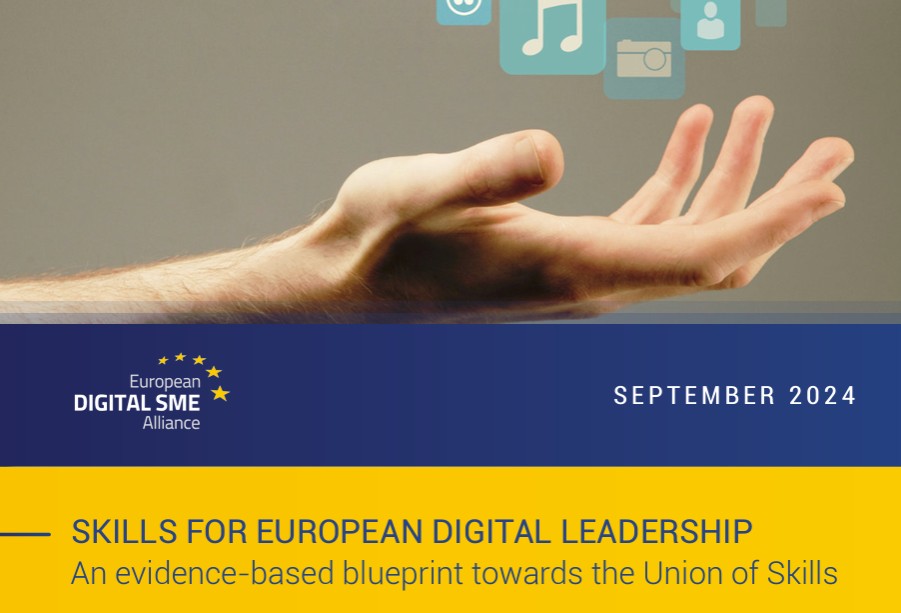
Accounting for 99% of all digital companies in the Single Market, small and
medium-sized enterprises (SMEs) are Europe’s best hope for achieving and
maintaining digital sovereignty through upskilling and reskilling activities. They
have long been among Europe’s most innovative and dynamic companies, playing
a crucial role in creating innovative digital training solutions for the SME
workforce. They also implement concrete measures to significantly enhance
digital skills among the broader EU population, focusing on typically underrepresented groups in the ICT sector.
Through a comprehensive research methodology involving more than 12,000 SMEs across 8 European countries, this White Paper addresses the critical need for digital skills among small and medium-sized enterprises (SMEs) and the broader population in Europe, emphasising the role of European digital SMEs in driving sustainable digital transformation across all sectors through their cuttingedge digital solutions, services, and best practices in upskilling and reskilling. This mixed-method approach, including a survey distributed to SMEs, expert advice, and analysis of EU initiatives, EU-funded projects, and other relevant data ensures a thorough understanding of the current European landscape and the identification of key areas for intervention:
- Artificial Intelligence (AI) Skills: The need for AI competencies is rapidly increasing. SMEs must equip their workforce with AI skills to harness the potential of data-driven decision-making and automation;
- Green and Digital Skills: Integrating sustainability with digitalisation is crucial. Skills that combine environmental awareness with digital proficiency can drive eco-friendly innovations and support Europe’s green agenda;
- Digital Resilience and Cybersecurity Skills: As cyber threats become more sophisticated, the importance of digital resilience and cybersecurity cannot be overstated. SMEs and public administrations need robust skills to protect their assets and maintain trust with stakeholders.
Based on a survey distributed to 9 National SME associations, clusters, and support agencies across 8 European countries, relevant best practices implemented by digital SMEs in the field of upskilling and reskilling of the European workforce and broader population – with a particular focus on underrepresented categories in the ICT sector – have been selected and showcased. As a conclusion of the research effort, the White Paper provides a set of six key policy recommendations for Europe to make full use of digital SMEs’ leadership set by the EU Commission President in the poltiical guidelines for the 2024 – 2029 mandate:
- Harness digital SMEs’ potential and empower them to be the protagonists of digitalisation and the digital upskilling and reskilling of the workforce across different industrial sectors;
- Introduce a new indicator into the Digital Economy and Society Index (DESI) to measure how much upskilling and reskilling digital SMEs provide to other SMEs and the public administration;
- Reinforce initiatives such as the Large-Scale Partnership and public-private partnerships on skills;
- Harmonise and simplify work rules, degrees, and professional digital skills certifications across EU Member States for greater talent mobility and better skills recognition;
- Expand digital upskilling and reskilling schemes by teaching “computational literacy”;
- Ramp up promising digital upskilling and reskilling programmes at a European and Member State level.
Source: European Digital SME Alliance
